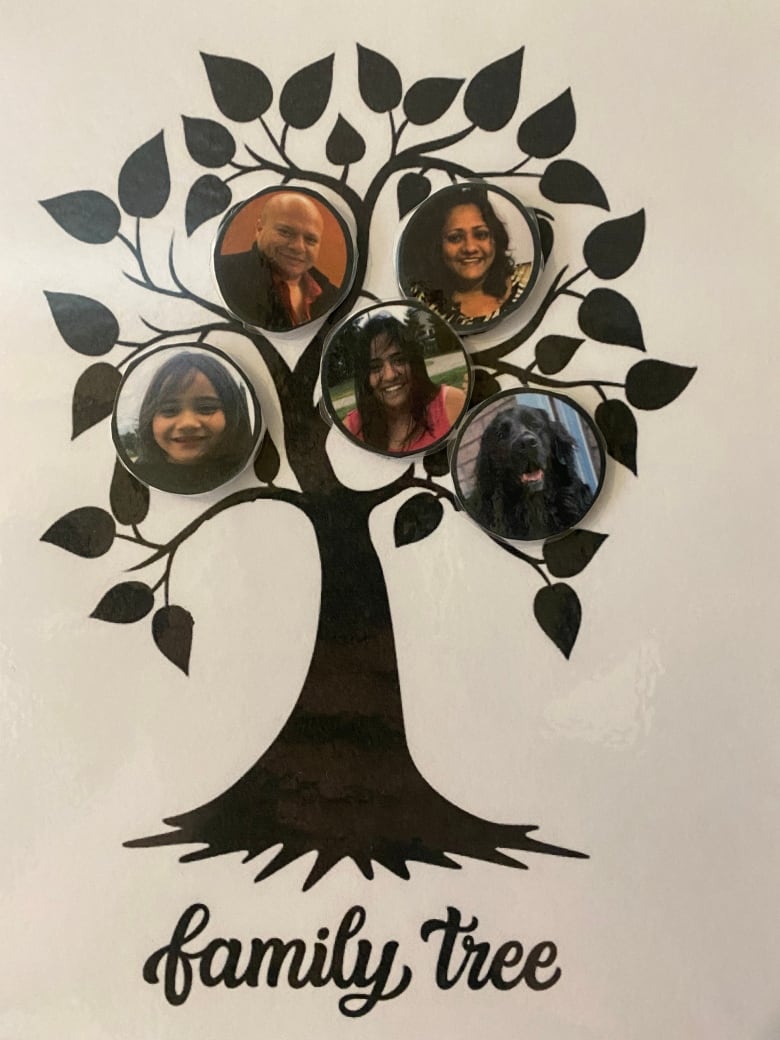
Sasha Singh says the day her family got a service dog for her daughter was life changing.
“I can tell you for a fact that the best therapist comes with fur and four legs,” she said.
Singh says Sammy, a Bernese mountain dog, was a big help to Catiana, 14, who is non-verbal and has autism.
“It gave us a normal life; we were able to do things as a family.”
But in March, Singh says Catiana’s life was turned upside down when National Service Dogs (NSD) took Sammy away without any notice after four years with the family.
Getting a service dog in Ontario requires a doctors note. Waiting lists can be years long and training the animals costs thousands of dollars. The family says they waited four years to get Sammy. But NSD, an organization based in Cambridge, Ont. that trains the animals for children diagnosed with autism, says the dog was obese and wasn’t in good enough health to continue working — something the family disputes.

Before Sammy was taken away, he passed his public access test, which demonstrates a dog is able to perform its duties as a service animal, “with flying colours,” the family says.
But Singh says they got a letter after the test saying Sammy was certified on a provisional basis, and when they asked why, NSD said it was because the dog was overweight.
“We explained to them over the last two years prior his work life suffered because of COVID. We couldn’t take the children out and he gained a bit of weight,” she said.
After exchanging emails, the family says the organization wanted to do a home visit to discuss a diet and exercise plan for the dog, but instead, he was taken away. Catiana’s father, Ricardo Portillo, says they were caught completely off guard.
“The day before, I spoke to them and they promised us the dog was not going to be taken away, that they were going to work on a plan to get him back on track,” he said.
“When they got here, two minutes into the conversation, they said we’re taking him away.”
He says NSD left a piece of paper with mental health resources, while his two daughters, who both have autism, were left “crying their hearts out.”
The family showed CBC News a note from a Mississauga vet referring to a visit they say took place just a few days before Sammy was taken away. The note stated he was “healthy and happy.”
“We reviewed the weight history and found the winter weight of 49.7 kg. to be acceptable and suggested a more ideal weight of 46 kg. to 47 kg.,” the note stated.
Removing dog a ‘last resort,’ NSD says
In a statement, NSD says Sammy was seen by more than one veterinarian.
“Other veterinarians have treated the dog for orthopedic issues relating to his obesity,” the statement said.
“Our thoughts are with the family and their children as they navigate this difficult transition. Fortunately, the subject service dog has begun the long journey to return to a healthy body weight under a daily exercise regime and proper nutrition, providing him relief from the orthopedic issues being exacerbated by his obesity.”
The statement also says there have been a few cases over the organization’s 26-year history where families have been unable to properly care for their service dogs and as “a last resort,” the decision is made to permanently remove the animal.

Laura Kirby-McIntosh, past president of the Ontario Autism Coalition, says she finds this family’s story “shocking” and says she’s never heard of a similar case before.
“On the face of it, it just seems really, really sad,” Kirby-McIntosh said.
“Service dogs are bred and trained to orient themselves toward the child so the bond is incredibly close.”
Kirby-McIntosh’s son, who has autism, also had a service dog for 10 years.
“There is an unspoken communication that exists between the dog and the child, because the dog is a judgment-free creature,” she said, noting the dog performs both safety functions and provides emotional support.
While Kirby-McIntosh acknowledges she doesn’t know all of the details, she feels for the family and especially the child, knowing the difference a service dog made in her son’s life.
“The only thing I could compare it to would be taking away a wheelchair from a person with a physical disability. These dogs give children with autism more freedom and independence.”
Family exploring human rights complaint
The family says since Sammy was taken away in March, they are unsatisfied with the communication with NSD. They say they don’t know how the dog is doing, and they even offered to purchase the dog, even if it meant Sammy wouldn’t be able to work.
“I can’t accept that they took him away without giving us another way out or a compromise,” Portillo said.
Singh says Catiana has regressed since March. She says her daughter is now unable to leave her home without being violent, and has long periods of time where she faces the wall and rocks back and forth.
The family is exploring options, including filing a human rights complaint.
“It’s not a dog for me, it’s my boy. We want him home,” Singh said.